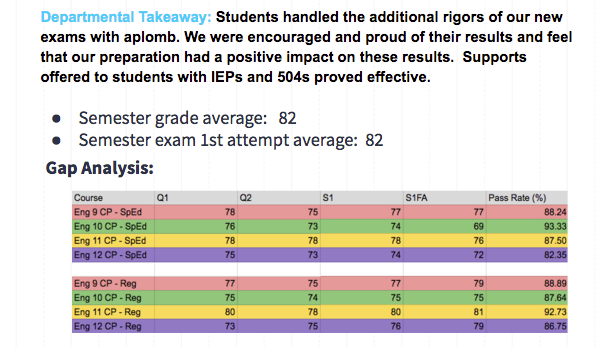In our March newsletter, we previewed the various ways we examine student data and how we use student performance results to identify needs and make adjustments to instruction. We would like to devote this newsletter to show how we are using this data. For the past couple of months, we have been examining department and course-specific data. We have taken a close look at quarter and semester grades and have compared this data with first attempt semester exam results. Departments have done the same and we have discussed key takeaways as a leadership team. Below are some of the questions that drove this work:
- What data point anchors your analysis/discussion?
- What was the focus of your discussion/analysis?
- Provide a summary of data-based discussion/analysis
- What specific actions will you take based on discussion/analysis?
- What is your timeline for implementation?
- How will you measure its effectiveness?
- How will you include students in your data/analysis/action?
Each department provided comparative data and a general Departmental Takeaway (see ELA example below):

Each course cohort within each department provided specific actions in response to data collected (see Earth & Space Science Action Steps below):
Students also contributed to the discussion and weighed in on the switch to semester exams. Members of the Student Advisory Board (SAB) and Ms. Auth's Statistics class developed a student survey to obtain student input on semester exams. Some examples of the survey questions include:
- Did the instruction during the semester match the content on the midterm exam?
- How beneficial was the review block at the end of the day for the upcoming exam?
- How much time did you spend studying for your exams?
- Did you feel that you had adequate time for all of your midterms?
- If you did not have enough time, how much extra time was needed?
- What time of exam questions did you find more challenging?
- Did you like the activities offered during the activity blocks?
Taken together, the departmental data and student feedback provides administration with valuable, actionable information. Here are some of our key takeaways:
- Departments have taken a thoughtful look at semester exam performance as it relates to semester exam content. For the majority of departments, semester exam performance aligned with quarter grades. Some departments will be revising their semester exams based on student performance.
- Departments have examined the time it took students to complete their semester exams. Based on feedback from students and teachers, we will add 10 minutes to each Exam Block for Semester 2 Exams. Here is an example of student feedback to the exam time question:
- Teachers are providing opportunities to reflect at the end of units of study to document essential questions, model problems and core content. Students have the opportunity to review and reflect on these concepts and skills, and are documenting for review in preparation for semester exams. This ongoing preparation/documentation is critical to student success in semester exams.
- Departments and administration have identified the importance of embedding study strategies into units of instruction so that students develop important study habits and are best prepared for their semester exams.
In addition to examining academic data, we review Attendance and Behavior Data quarterly, and review policies and practices that improve our school-wide focus on teaching and learning.
While our absences this year follow historical trends, they are up slightly over last year. Missed instruction is difficult to recreate and undermines academic performance. 2-5% absence of the total population is a norm we are working hard to reduce. We need students here daily!
Total referrals at the high school mirror last year’s numbers. We look for trends in behavioral referrals, and work closely with students who are multiple offenders. We are making a conscious effort to minimize Out of School Suspension days, as students need to stay connected to instruction. We call home the day before students are scheduled to serve detentions of any kind, and call students down before the last bell to minimize the number of skipped detentions. Your support in reducing these “compounding consequences” (serving a detention for skipping a detention) is appreciated! Our Deans set goals with and monitor the progress of students struggling to meet our behavioral expectations to reconnect them to teachers, classmates and learning.
Preventative and responsive approaches are available for students who are at-risk due to multiple course failures, chronic absenteeism, excessive discipline entries, or being significantly behind in portfolio entry submissions. A team of student support staff, teachers, administrators and the student meet to develop a solution-focused plan with short-term goals to help the student meet with success. These goals are revisited and adjusted as needed.
Our data analysis and action plans are living documents that adjust to the changing needs of our students and the resources available to support them. We are committed to refining policies and systems that ensure that our instruction and assessments are rigorous and fair, that all students have equal access to supports necessary to succeed, and that they are afforded the opportunities to become increasingly self-directed learners.
Craig M. MacKenzie, Principal Twitter: @dflamturnover
Andrea J. Spas, Assistant Principal Twitter: @Andrea_Spas
Susan J. Votto, Director of CHARIHOtech Twitter: @CHARIHOtech
Andrea J. Spas, Assistant Principal Twitter: @Andrea_Spas
Susan J. Votto, Director of CHARIHOtech Twitter: @CHARIHOtech















